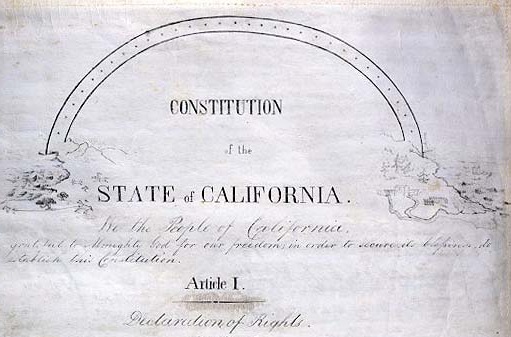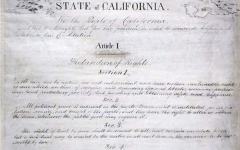
California Constitution. (Photo: www.sos.ca.gov)
Frequently Asked Questions about the California Constitution Article XIIIA
Can special taxes be imposed by local governments?
By Chris Micheli, May 25, 2024 2:31 am
How many sections does Article 13A have? This article contains seven sections.
What does Article 13 relate to? It relates to tax limitations.
Is there a cap on property taxes in this state? Section 1 states that the maximum amount of any ad valorem tax on real property cannot exceed 1% of the full cash value of the property.
How are property taxes collected and distributed? Section 1 provides that the 1% tax is to be collected by the counties and apportioned according to law to the districts within the counties.
What is the full cash value of property? Section 2 defines the term “full cash value” to mean the county assessor’s valuation of real property as shown on the 1975–76 tax bill under “full cash value” or, thereafter, the appraised value of real property when purchased, newly constructed, or a change in ownership has occurred after the 1975 assessment.
Is there a limit on tax increases enacted by the Legislature? Section 3 provides that any change in state statute which results in any taxpayer paying a higher tax must be imposed by an act passed by not less than two-thirds of all members elected to each of the two houses of the Legislature, except that no new ad valorem taxes on real property, or sales or transaction taxes on the sales of real property may be imposed.
Can special taxes be imposed by local governments? Section 4 states that cities, counties and special districts, by a two-thirds vote of the qualified electors of that district, may impose special taxes on the district, except ad valorem taxes on real property or a transaction tax or sales tax on the sale of real property within the city, county or special district.
When does this article tax effect? Section 5 specifies that this article takes effect for the tax year beginning on July 1 following the passage of this amendment, except Section 3 which became effective upon the passage of this article.
Is there a severability clause? Section 6 provides that, if any section, part, clause, or phrase hereof is for any reason held to be invalid or unconstitutional, the remaining sections are not affected, but instead will remain in full force and effect.
Are there any exclusions for this article? Section 7 provides that Section 3 of this article does not apply to the California Children and Families First Act of 1998.
- Wildlife Management Areas - March 3, 2026
- County Revenues for Fish and Game - March 3, 2026
- Designating ‘Spot’ Bills in the California Legislature - March 2, 2026



One thought on “Frequently Asked Questions about the California Constitution Article XIIIA”